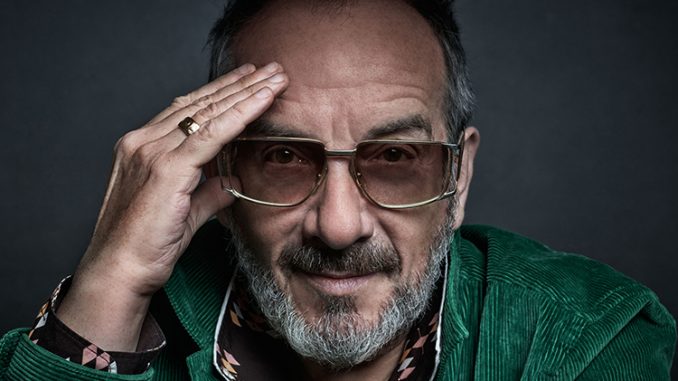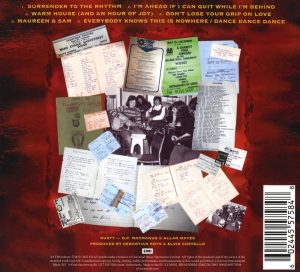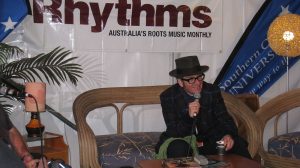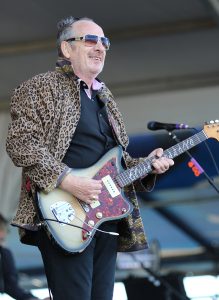
By Brian Wise.
Elvis Costello has returned to Australia for Bluesfest and sideshows but last year he released an album of songs he used to play as DP McManus with his friend Allan Mayes 50 years ago.
Elvis Costello finally returned to Australia this month for a Bluesfest appearance and a series of shows that were due to happen last year but were postponed due to the ubiquitous Covid. Since then, he has been touring constantly, even appearing at the Museum of Natural History in New York for a fundraiser. In fact, most of this year is going to be taken up with touring, either with his band (often featuring Charlie Sexton) or as a duo with Steve Nieve in the northern autumn.
“I take that view of everything that’s at my disposal and I’ve tried to make myself think a little harder in advance, so that I can be at ease in the moment that I’m not shortchanging the audience and I’m actually bringing the selection of the best songs,” replies Costello when I ask him what we can expect from the set lists this time around.
“I’ve written some of them very familiar to you, some of them not so familiar in my experience of the recent shows. Some of the numbers that got the most vociferous response were in fact songs that I wouldn’t think were among the better known but for whatever reason they hit a nerve with the audience. So, that’s a good sign. I think trusting your instincts in that way is good.”
While Costello might not have a new album out with The Imposters – and late last year he was celebrating the Hal Leonard publication of the score of The Juliet Letters for the Brodsky Quartet’s 30th Anniversary Edition – he has found time over the past year to revisit his past on a project of which probably only ardent fans would have been aware. You can always rely on Elvis Costello to be working on something that piques one’s interest.
In May 2022, Costello released the album Rusty: The Resurrection of Rust, based on songs he played 50 years ago as DP McManus with his old bandmate Allan Mayes. This certainly pre-dates the first time I ever heard Costello when Charlie Gillett played some of the DP McManus demos on the revered Radio London program Honky Tonk.
 According to Costello the Rusty album is “the record we would have cut when we were 18, if anyone had let us.” It features six songs from the band’s 1972 set lists, including: ‘Surrender to the Rhythm’ and ‘Don’t Lose Your Grip on Love’ written by Nick Lowe while he was in Brinsley Schwarz; ‘I’m Ahead If I Can Quit While I’m Behind’ by eccentric American songwriter Jim Ford’s (also a favourite of Lowe’s); a medley of Neil Young’s ‘Everybody Knows This Is Nowhere’ and ‘Dance, Dance, Dance’; and, two originals titled ‘Warm House’ and ‘Maureen and Sam’.
According to Costello the Rusty album is “the record we would have cut when we were 18, if anyone had let us.” It features six songs from the band’s 1972 set lists, including: ‘Surrender to the Rhythm’ and ‘Don’t Lose Your Grip on Love’ written by Nick Lowe while he was in Brinsley Schwarz; ‘I’m Ahead If I Can Quit While I’m Behind’ by eccentric American songwriter Jim Ford’s (also a favourite of Lowe’s); a medley of Neil Young’s ‘Everybody Knows This Is Nowhere’ and ‘Dance, Dance, Dance’; and, two originals titled ‘Warm House’ and ‘Maureen and Sam’.
Costello had apparently been playing five or six nights a week while he was at school but once he got a job as a computer operator the Rusty gigs revolved around his shift work – until he left Liverpool for London in early 1973. Five years later he released his debut album My Aim Is True – the first of 32 albums so far – but that seminal experience with Rusty has obviously a fond place in his heart.
 Of course, the difference between Rusty then and now is that the more than a half a century on both Costello and Mayes are obviously far more accomplished. They are also assisted by members of Costello’s band, as well as Bob Andrews, an original member of Brinsley Schwarz (on ‘Surrender To The Rhythm’). So, this is way ahead of what a demo might have sounded like had it been made back in 1973. In fact, it is not only quite charming but you can also see how this is the sound of the great pub rock era of the early to mid’70s, pioneered by the Brinsleys in London. At the very least, it is partial vindication of my long-time reverence for Brinsley Schwarz, the band, and Nick Lowe, the writer.
Of course, the difference between Rusty then and now is that the more than a half a century on both Costello and Mayes are obviously far more accomplished. They are also assisted by members of Costello’s band, as well as Bob Andrews, an original member of Brinsley Schwarz (on ‘Surrender To The Rhythm’). So, this is way ahead of what a demo might have sounded like had it been made back in 1973. In fact, it is not only quite charming but you can also see how this is the sound of the great pub rock era of the early to mid’70s, pioneered by the Brinsleys in London. At the very least, it is partial vindication of my long-time reverence for Brinsley Schwarz, the band, and Nick Lowe, the writer.
When I ask Costello how the resurrection of Rusty came about, he admits that it was Allan Mayes who reminded him of the 50thanniversary of their collaboration and suggested they record some songs and release them on a cassette.
“There’s a couple of things wrong with that idea,” Costello told his friend. “One is that the cassette is not the most common form of communication anymore and some of those friends are not around. So, maybe we should just make the record that we would’ve made at 17 and 18 when we first met. So, we did. We just cut an EP with the Imposters backing us and it was great fun to do.
“So, we cut a couple of songs from those days, a couple of my earlier songs and a couple of Nick Lowe songs that I think we were quite happy to let people believe we had written in when we did our shows because the songs weren’t terribly well known, and a couple of Neil Young tunes that we jammed together in an arrangement. It was really a great thing. Then Allan came and played with the imposters in New York. We did a festival appearance in San Francisco and Golden Gate Park [Hardly Strictly] and we did The Tonight Show together and we were on the bill with Madonna – so it was lucky that we practiced our dance steps before we did it!”
Costello points out that he and Mayes share lead and harmony vocals on Jim Ford’s ‘I’m Ahead If I Can Quit While I’m Behind’, a title that typifies the sense of humour of a writer who was a friend of Sly Stone and whose songs were also recorded by Aretha Franklin and Bobby Womack.
“Nick had done Jim’s songs in the Brinsleys and, also in Rockpile, performed ‘Ju Ju Man’ and ‘36 Inches High’,” he explains. “One of my favourites is a song that Bobby Womack recorded, which I cut for a television series called Vinyl. It’s a song called ‘Point of Return’. Of course, he also wrote ‘Harry Hippie’, which Womack recorded and had a big hit on.
“So, I mean I’ve always been a fan of that kind of soul balladry, I suppose you call it. They were kind R&B ballads where all the words mean different things to different people now depending on their generation. But I think of the most country soul kind of style like Donnie Fritz, that kind of music. Jim Ford came out of Kentucky and was a really good songwriter. It’s not a surprise for the Sly recognised the guy as well.
“The songs have really unusual lyrics and that’s what I like.
You’re the biggest chocolate covered liar I’ve ever seen. [‘Point of No Return’].
It’s a funny way of saying, ‘Did you eat the cake?’ He just had a thing that would stick out.
I’d like to help a man when he’s down /But I can’t help him much when he’s sleeping on the ground / Sorry, Harry, think I’m gonna put you down.
But it’s not a put down line. It’s a sad line really because it’s somebody who won’t lift themselves up. You get the feeling that that was a comment on people being too stoned to care or something. That was a true line, I think.”

While 2023 eventually proved to be productive for Costello once he overcame the postponement of the Australian tour and missing Bluesfest, there was also sadness when two of his idols passed away within six months of each other: Burt Bacharach with whom he had worked closely and Tony Bennett, whose 80th birthday celebration Costello had sung at.
“It’s hard to imagine the world without him,” says Costello of Bennett, “but we’re fortunate to have spent some good evenings together and shared the stage with him on a number of occasions. My wife [Diana Krall], of course, made the second to last record that he made. I think that’s a beautiful, very intimate record of Gershwin songs that they recorded, which is incredible. He remained in great voice to his last performance. He just had a supernatural kind of quality, really something very great.”
In tribute to Burt Bacharach, Costello has released a 4-CD box set that includes the songs they wrote together, along with Costello’s versions of some of Bacharach’s favourite other compositions.
“I tried to find all the words that I could say on that topic, and I put them into the essay that was in the box,” says Costello of his friend and mentor. “I wanted to put everything that I had to say to tell the story of somebody’s compositions I had known before I knew his name. I knew the songs; I heard them sung on the radio and on television when I was just a child. Then throughout the sixties, of course, like everybody I heard all the songs that became really associated with Dionne Warwick and all the other singers that sang his songs, like Aretha Franklin and Tom Jones and Dusty Springfield and so on and so forth. Then, in later years, my wife’s recording of the ‘Look of Love’ is probably the other famous version of that song after Dusty’s original from Casino Royale. To think that we worked for nearly 30 years on songwriting together is remarkable to me!”
While we mourn the loss of greats such as Bennett and Bacharach, there is one hero of Costello’s that he saw only the night before we spoke: Bob Dylan. In fact, it was the fourth time that Costello saw him on that leg of his tour late last year. (Of course, Costello’s band includes guitarist Charlie Sexton, who spent years with Dylan).
“I want to see it again because it’s kind like going to see a play multiple times because the text is so rich of the songs,” explains Costello, the music fan. “There’s something I think you get from hearing the different emphasis that’s placed on it in different nights. I find that very fascinating. I’m fortunate to have the opportunity to right now be finished with my touring. I’m working on some other things but I’m at home base for a few days.”
“I saw the Rolling Stones from about 30 feet away,” he adds of the New York club show promoting the latest album Hackney Diamonds. “I didn’t ever expect to see the Rolling Stones at a club. I mean, my family home in the Sixties was about a quarter of a mile away from the Station Hotel but I was way too young to go there when the stars were playing there in Richmond. I never thought I’d ever see the Stones up so close, and they were just great. It was a short appearance to announce the release of their new record, but it was in a great spirit and people really enjoyed it.”

